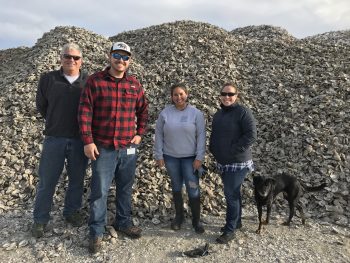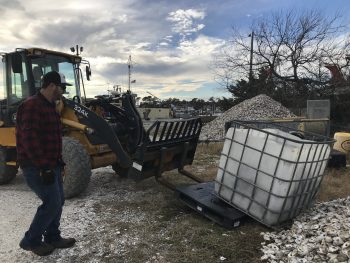A ton of oyster shells made a unique journey from the sea to the mountains and back to the sea this month.
The North Carolina Coastal Federation received over 2,000 lbs of oysters from the Highlands Food and Wine Festival. The Highlands Food and Wine Festival is an annual event that takes place just west of Asheville and features North Carolina food, wine and North Carolina oysters.
 Over 2,000 lbs — about 25 bushels— of North Carolina oysters were harvested then transported to Highlands and consumed at the event. This year, the event’s waste management was handled by ZeroHero, an organization dedicated to reducing waste following large events. Rather than sending the waste to landfills, ZeroHero recognized the importance of recycling oyster shells and contacted the federation.
Over 2,000 lbs — about 25 bushels— of North Carolina oysters were harvested then transported to Highlands and consumed at the event. This year, the event’s waste management was handled by ZeroHero, an organization dedicated to reducing waste following large events. Rather than sending the waste to landfills, ZeroHero recognized the importance of recycling oyster shells and contacted the federation.
The federation uses recycled oyster shells to restore oyster reefs in our waters. The empty shells can be strategically placed in coastal waters where they will attract and grow new oyster reefs.
“This is a great example of people coming together to do the right thing,” said Leslie Vegas, Northeast coastal specialist for the federation and the regional lead on shell recycling. “The event organizers and Macon County realized the importance of getting these shells back to the coast where they can be used to grow more oysters.”
 From 2003 to 2013, the state of North Carolina ran a state-funded shell recycling program. Through the program, the Division of Marine Fisheries provided centralized drop off locations, the collection and transportation of shells from restaurants, festivals and oyster roasts and the maintenance of dumpsters. From 2013 to 2018, they ran a scaled-down program with limited grant funding that provided drop off locations for collecting the shell. While operating, the program provided 6-15% of the needed material for restoration activities. Unfortunately, due to budget cuts and a reduction in staff, as of 2018, all state-run oyster shell recycling centers have been removed in North Carolina.
From 2003 to 2013, the state of North Carolina ran a state-funded shell recycling program. Through the program, the Division of Marine Fisheries provided centralized drop off locations, the collection and transportation of shells from restaurants, festivals and oyster roasts and the maintenance of dumpsters. From 2013 to 2018, they ran a scaled-down program with limited grant funding that provided drop off locations for collecting the shell. While operating, the program provided 6-15% of the needed material for restoration activities. Unfortunately, due to budget cuts and a reduction in staff, as of 2018, all state-run oyster shell recycling centers have been removed in North Carolina.
Since the state program has been cut, the federation has stepped in, where possible, to coordinate shell recycling efforts from oyster roasts and coastal restaurants.
In coordination with Macon County Public Works and the Division of Marine Fisheries, the shells were driven eight hours across the state by Shaun Cribbs, recycling coordinator at Macon County Public Works, to be used in habitat restoration projects by the federation.
“We’re proud to have been able to make the connections and coordinate this effort. The shells will be used in our local restoration efforts to grow more oysters,” said Vegas.
For more information about the federation’s local oyster restoration efforts and shell recycling visit: www.nccoast.org/oysters or www.ncoysters.org
